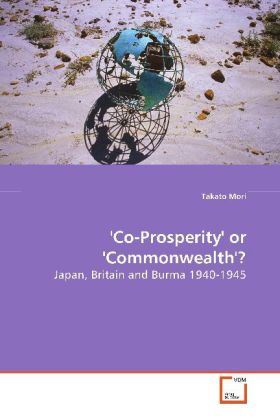
Zustellung: Mo, 14.07. - Mi, 16.07.
Versand in 4 Tagen
VersandkostenfreiBestellen & in Filiale abholen:
This is a study of the interplay and differing
world-views of Japan and Britain with regard to
Southeast Asia and in particular to Burma before and
during the Pacific War.
The Japanese expansion into Southeast Asia
during 1940-1945 has been a focus of much
historiographical and public debate in recent years.
While many of existing literature focus on the
relations and conflict between Japan and the United
States, the essential polarity in Southeast Asia was
between British and Japanese imperialisms.
The two countries differed markedly in as much
as the British defended the status quo while Japan
aspired to a new order. Yet there was both interplay
and similarity between them. Indeed, there was
symmetry in their fortunes during this period and in
the competing ideologies of Co-Prosperity and Commonwealth .
This study, produced as a doctoral thesis,
examines the rise and fall of Japan''s Greater East
Asia Co-Prosperity Sphere and its impact on the
British policy in Southeast Asia. The interactions
between Japan and Britain considered at the general
level are also examined through a case study of Burma.
world-views of Japan and Britain with regard to
Southeast Asia and in particular to Burma before and
during the Pacific War.
The Japanese expansion into Southeast Asia
during 1940-1945 has been a focus of much
historiographical and public debate in recent years.
While many of existing literature focus on the
relations and conflict between Japan and the United
States, the essential polarity in Southeast Asia was
between British and Japanese imperialisms.
The two countries differed markedly in as much
as the British defended the status quo while Japan
aspired to a new order. Yet there was both interplay
and similarity between them. Indeed, there was
symmetry in their fortunes during this period and in
the competing ideologies of Co-Prosperity and Commonwealth .
This study, produced as a doctoral thesis,
examines the rise and fall of Japan''s Greater East
Asia Co-Prosperity Sphere and its impact on the
British policy in Southeast Asia. The interactions
between Japan and Britain considered at the general
level are also examined through a case study of Burma.
Produktdetails
Erscheinungsdatum
01. Juni 2009
Sprache
englisch
Seitenanzahl
240
Autor/Autorin
Takato Mori
Verlag/Hersteller
Produktart
kartoniert
Gewicht
374 g
ISBN
9783639156287
Bewertungen
0 Bewertungen
Es wurden noch keine Bewertungen abgegeben. Schreiben Sie die erste Bewertung zu "'Co-Prosperity' or 'Commonwealth'?" und helfen Sie damit anderen bei der Kaufentscheidung.









